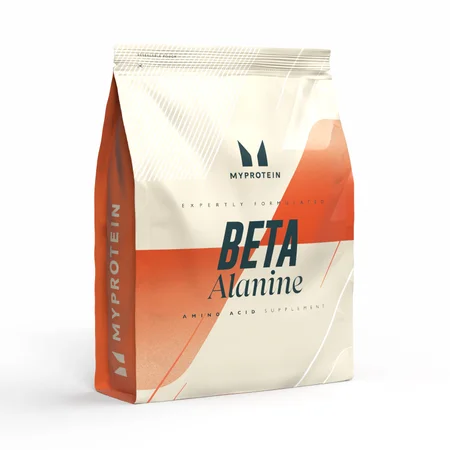
Beta-alanine is used as a staple ingredient in most pre workout supplements and is responsible for that unmistakable tingling sensation. Beta-alanine has been linked to a number of benefits which may potentially lead to increased sporting performance and improved body composition.1
The following article will outline the key benefits, the adequate dosage and any potential side effects.
- What is beta-alanine
- How does it work?
- Beta-alanine benefits
- Beta-alanine food sources
- Dosage
- Side effects of beta-alanine
What is beta-alanine?
Beta-alanine is an amino acid which is produced in the liver and found in foods such as meat and poultry.
It combines with another amino acid called histidine, which when they are joined together, form carnosine. Carnosine is an important ‘buffering agent’ which helps your body’s resistance to fatigue during exercise.
Summary:
How does it work?
The way in which beta-alanine supplementation may improve exercise performance is via its capacity to increase your body’s storage of carnosine.2 Carnosine is a buffering agent which helps prevent fatigue.2
When working at a high intensity, your body can tire via a process called metabolic acidosis. This is where, when exercising at a high intensity with high levels of lactate being produced, there is a build-up of hydrogen (H+) ions. H+ ions are acidic and a build-up of H+ ions will cause a drop in the pH of the blood (making it more acidic).
When the pH of your blood falls, it will disrupt the release of calcium in the muscle cell. Calcium plays a critical role in muscle contraction, so if the release of calcium is restricted, your muscles won’t be able to contract properly, resulting in a drop in function.2
A drop in blood pH during exercise will also reduce enzyme activity which is crucial in energy production.2
Your body is most likely to fall into metabolic acidosis when working at a high intensity for 1 to 4 minutes. This is due to the different mechanisms of fatigue and energy systems used at different exercise intensities.
By supplementing with beta-alanine, you’ll increase your storage of carnosine.2 Carnosine can prevent acidosis by acting as a buffer from the H+ ions which will prevent the pH of your blood dropping too low and which stops you tiring as quickly.2 Put simply, carnosine neutralises acidic H+ ions which prevents the pH of the blood dropping.
Evidence has shown that beta-alanine can raise carnosine levels by up to 80%.1 This increased carnosine storage may will help prevent metabolic acidosis and keep you training at a higher intensity for longer. This may equate to more reps or sets during a resistance training session and improved recovery from repeated sprints.
Summary:
What are the benefits of beta-alanine?
Beta-alanine improves performance during high intensity exercise
The evidence suggests that beta-alanine supplementation is most effective at improving high intensity exercise performance by helping with resistance to fatigue. As such, those who will see the most benefit from beta-alanine supplementation are people competing in sporting events such as a 4km cycle race, 2000m rowing, 100m and 200m swimming races and combat sports.3
Additionally, sports which require repeated sprints such as football and rugby4 will also see improvements due to quicker recovery rates.5
Despite this, there are still a number of benefits that may well improve your performance in the gym even if you are not training specifically for a sport.
Beta-alanine may increase strength and muscle mass
There’s evidence to show that beta-alanine supplementation can help increase volume during a resistance training session. For example, increased amounts of carnosine may well equate to more reps and sets during a session.
This was highlighted in a study that showed beta-alanine supplementation for a period of 10 weeks showed greater increases in reps performed in both the squat and bench press.6
Over a period of time, this may potentially lead to increased strength training adaptations and increased muscle mass.1
Beta-alanine supplementation can also prevent metabolic acidosis following exercise which may improve recovery and enable you to get back to your training faster than before.
Beta-alanine could improve body composition - muscle mass and fat loss
Beta-alanine may result in increases in lean body (muscle) mass and improved fat loss due to its capacity to increase training volume and improve recovery between sessions.
This is supported by the results of a study performed in collegiate wrestlers and American football players. Over the course of 8 weeks, following a program consisting of resistance training, high intensity intervals, and repeated sprints, those that supplemented beta-alanine gained more lean body mass and improved their body composition to a greater degree.7
It may improve endurance exercise performance
As lactate isn’t produced in the same quantity during aerobic exercise, carnosine isn’t used as a buffer to the same extent. There may, however, be other ways in which increased carnosine storage may help prevent fatigue in exercise lasting a longer duration.
For example, there’s evidence to show that supplementing beta-alanine alongside a high intensity interval training program can enhance training adaptations and subsequently improve exercise endurance.8
Food sources of beta-alanine
As beta-alanine is an amino acid, it can be found in foods high in protein. These include:
- Chicken
- Beef
- Pork
- Fish
Beta-alanine dosage
As the main function of beta-alanine is to increase the amount of storage of carnosine, it needs to be supplemented over the course of weeks rather than a single dose in order to see the benefits.1
The optimal dosage of beta-alanine is 4-6g a day, split into doses of 2g for 2-4 weeks.1 After 4 weeks, carnosine storage has been shown to be increased by 40% and after 10% around 80%.1
It's worth noting that those who have a lower baseline level of carnosine are likely to see greater improvements in performance. For example, vegetarians may not get as much beta-alanine in their diet due to a lack of meat and fish.
Side effects
The main side effects of large amounts of beta-alanine consumption is ‘tingling’ in the skin, often on the face or the back of the hands.
However, this doesn’t happen in everybody and although it’s perfectly safe, it’s not clear why this occurs and why it happens in some individuals and not others.
To reduce the likelihood of skin tingling, it’s recommended that you distribute your intake throughout the day or use a time-released beta-alanine supplement.1
Other than the tingling, there is no evidence that consuming the recommended amounts poses any health risks.1
Take home message
Beta-alanine is an amino acid which increases carnosine storage. Carnosine is a buffering agent which helps to reduce fatigue. This is especially the case during high intensity exercise lasting between 1 and 4 minutes.
For some, beta-alanine can cause tingling in the face and hands, but this can be reduced by lowering your dosage and distributing throughout the day.
Beta-alanine is found in high protein foods such as chicken, beef, pork and fish meaning vegetarians may see bigger increases in performance.
The recommended dosage is 4-6g a day for 2-4 weeks.
READ THESE NEXT:

Liam is a certified sport nutritionist with the International Society of Sport Nutrition and is enrolled on the British Dietetics Association’s Sport and Exercise Nutrition register. He has a Bachelor’s of Science in Sport and Exercise Science and is graduate of the ISSN Diploma in Applied Sport and Exercise Nutrition.
Liam is an experienced personal trainer, helping clients reach their health and fitness goals with practical, evidence informed exercise and nutrition advice. In his spare time Liam has competed in numerous powerlifting competitions and enjoys hill walking, football and expanding his recipe repertoire in the kitchen.Find out more about Liam's experience here.
1. Trexler, E., Smith-Ryan, A., Stout, J., Hoffman, J., Wilborn, C., Sale, C., Kreider, R., Jäger, R., Earnest, C., Bannock, L., Campbell, B., Kalman, D., Ziegenfuss, T. and Antonio, J. (2015). International society of sports nutrition position stand: Beta-Alanine. Journal of the International Society of Sports Nutrition, 12(1).
2. Sale, C., Saunders, B. and Harris, R. (2009). Effect of beta-alanine supplementation on muscle carnosine concentrations and exercise performance. Amino Acids, 39(2), pp.321-333.
3. Brisola, G. and Zagatto, A. (2019). Ergogenic Effects of β-Alanine Supplementation on Different Sports Modalities. Journal of Strength and Conditioning Research, 33(1), pp.253-282.
4. Kelly, V. (2017). β-alanine: performance effects, usage and side effects. British Journal of Sports Medicine, 52(5), pp.311-312.
5. Dolan, E., Elliott-Sale, K., Artioli, G., Swinton, P., Roschel, H., Sale, C., Gualano, B. and Saunders, B. (2017). β-alanine Supplementation To Improve Exercise Capacity And Performance. Medicine & Science in Sports & Exercise, 49, p.84.
6. Hoffman, J., Ratamess, N., Kang, J., Mangine, G., Faigenbaum, A. and Stout, J. (2006). Effect of Creatine and ß-Alanine Supplementation on Performance and Endocrine Responses in Strength/Power Athletes. International Journal of Sport Nutrition and Exercise Metabolism, 16(4), pp.430-446.
7. Smith, A., Walter, A., Graef, J., Kendall, K., Moon, J., Lockwood, C., Fukuda, D., Beck, T., Cramer, J. and Stout, J. (2009). Effects of β-alanine supplementation and high-intensity interval training on endurance performance and body composition in men; a double-blind trial. Journal of the International Society of Sports Nutrition, 6(1), p.5.
8. Kern, B. and Robinson, T. (2011). Effects of β-Alanine Supplementation on Performance and Body Composition in Collegiate Wrestlers and Football Players. Journal of Strength and Conditioning Research, 25(7), pp.1804-1815.





